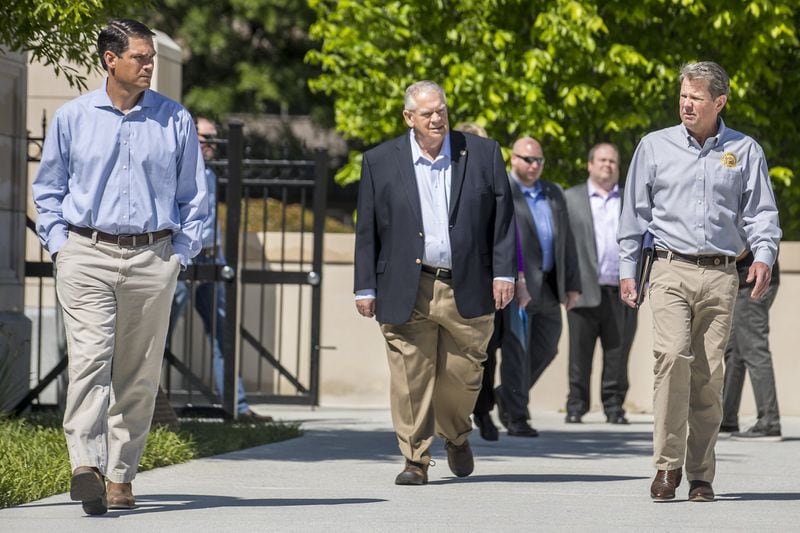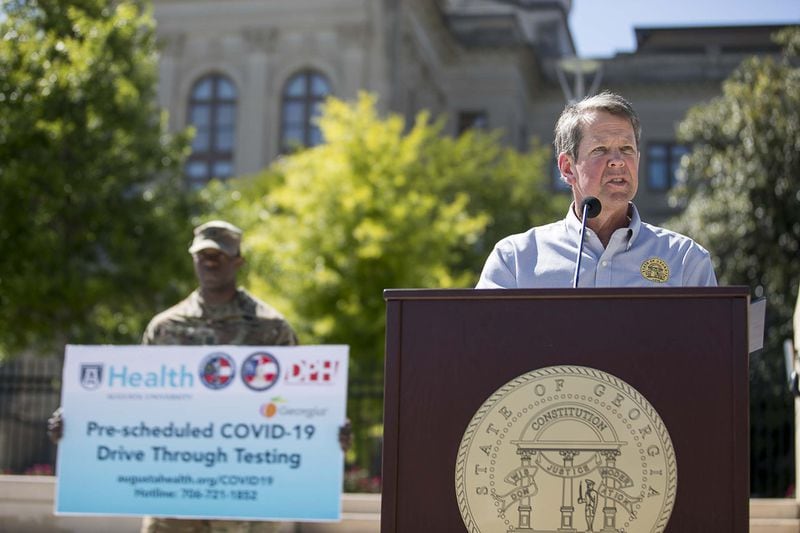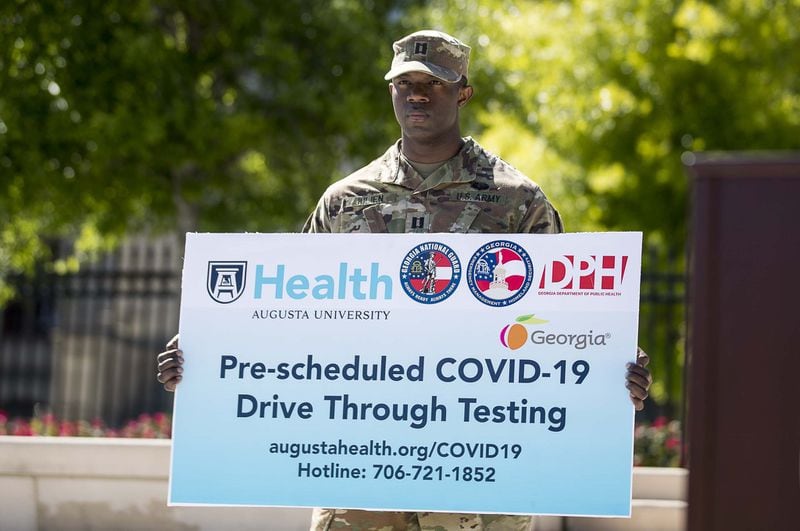Gov. Brian Kemp took the first step Monday to reopen a Georgia economy battered by social restrictions to contain the coronavirus, even as public health experts warned he was all but inviting a new wave of infections.
“It’s a very big risk,” said Dr. Marc Lipsitch, a professor of epidemiology at the Harvard T.H. Chan School of Public Health. “If you open up enough, it’s almost for certain” the virus will hit Georgia again. It’s just waiting for more susceptible people and more contacts. That’s how viruses work.”
But Kemp said his decision to allow certain businesses — gyms, barber shops, tattoo parlors and bowling alleys, among others — to open their doors on Friday is a “measured” approach to balancing economic and public health concerns.
Reopened businesses will have to follow social distancing guidelines, screen workers for fever and respiratory illnesses, and take other steps to minimize the risk of transmitting the virus.
“We have been surgical, targeted and methodical,” Kemp said at a news conference outside the state Capitol, “always putting the health and well-being of our citizens first, and doing our best to protect lives — and livelihoods — in every part of Georgia.”
Kemp also announced that theaters and dine-in restaurants will be allowed to reopen on April 27. However, a statewide shelter-at-home order remains in effect through the end of the month, and Kemp said the elderly and people who are “medically fragile” should stay home until at least mid-May.
“By taking this measured action, we will get Georgians back to work safely without undermining the progress that we have all made in the battle against COVID-19,” Kemp said.
The announcement, expected since late last week, came as Georgia’s death toll from COVID-19, the disease caused by the new coronavirus, reached 775 by Monday evening — an increase of 86 since Sunday night. Laboratory tests have confirmed coronavirus diagnoses in more than 19,000 Georgians.
Nursing homes and other long-term care facilities have been especially devastated. State officials said Monday that 295 residents of those facilities have died from the virus, including 45 since Friday.
Credit: Alyssa Pointer/AJC
Credit: Alyssa Pointer/AJC
At Monday’s news conference, Kemp and Dr. Kathleen Toomey, the state public health commissioner, said the governor’s plan complies with federal guidelines on lifting state lockdowns imposed to contain the coronavirus. President Donald Trump said last week that states should have adequate hospital, testing and contact-tracing capacity in place before starting the process of reopening their economies.
Toomey said emergency rooms are seeing fewer flu-like ailments, and the state will beef up contact tracing, which identifies people with the virus and follows their movements, as they may have infected others.
“We definitely have a plateauing and what appears to be a decline,” Toomey said.
Others are skeptical.
“Tell me all those things are in place and hospitals are ready for a worst-case scenario and we’re prepared if it flares back up, then OK,” said Dr. Harry J. Heiman, a clinical associate professor at Georgia State University’s School of Public Health. “People are appropriately afraid. People want to know their leaders understand what is going on, that they are working to understand what they don’t know, and that they have a plan to deal with it.”
Kemp was among the last of the nation’s governors to impose statewide social-distancing measures, and now is among the first to begin lifting them. With applications for unemployment benefits soaring and companies large and small limiting their operations, he has been under pressure from business leaders and some political figures to end the lockdown as soon as possible.
“We can’t live like this forever,” Will Bentley said last week. Bentley, president of the Georgia Agribusiness Council, is a member of Kemp’s coronavirus task force.
In addition to lifting the order closing certain businesses, Kemp announced that the state has enough personal protective equipment for health care workers that hospitals can again perform elective surgeries and other non-emergency procedures. Kemp had urged hospitals to limit operations, but had never issued such an order.
But many long-term care facilities are still struggling to outfit their staffs with protective equipment, said Ginny Helms, chief executive of LeadingAge, which represents nonprofits that provide senior care and housing.
“Supply chains are opening up, but we still aren’t where we need to be for them,” Helms said.
COMPLETE COVERAGE: CORONAVIRUS IN GEORGIA
Under the emergency powers granted him by the General Assembly, Kemp said the easing of business restrictions would be uniform statewide “and will be the operational standard in all jurisdictions.”
“This means local action cannot be taken that is more or less restrictive,” Kemp said, adding that officials would monitor “hot spots.”
When Kemp first imposed the shelter-at-home order, he said it superseded stricter local measures, angering many local government officials.
COVID-19 PHOTOS: CITY OF SOLITUDE
COVID-19 PHOTOS: AROUND GEORGIA
In an interview Monday, Mayor Bo Dorough of Albany, where nearly 100 people have died from the coronavirus, said he fears the governor’s action will undermine efforts to stem the virus’ spread.
“I think the decision is irresponsible,” Dorough said. “I’m flabbergasted that the governor would say we can’t take additional precautions to protect our citizens. This isn’t a mixed signal. It’s a U-turn.”
Atlanta Mayor Keisha Lance Bottoms said Kemp’s decision left her baffled.
“I still have my voice that I can use, and what I’ll continue to ask Atlantans is to please stay at home,” Bottoms told ABC News. “We don’t know what the governor is looking at, but what I do know is we have nearly 19,000 people who have tested positive as of this evening.”
Democratic lawmakers were even more critical.
“There’s no way I’m getting a haircut or dining in a restaurant, even though I really want to,” said state Rep. Bee Nyguyen, D-Atlanta.
“This is not good,” she said. “This is going to get more Georgians killed.”
WHAT CAN REOPEN
Gyms, bowling alleys, salons and some other indoor facilities can resume operations Friday, while restaurants and movie theaters can reopen next week. All must follow social distancing and other guidelines issued by the state, although current restrictions have not been aggressively enforced.










